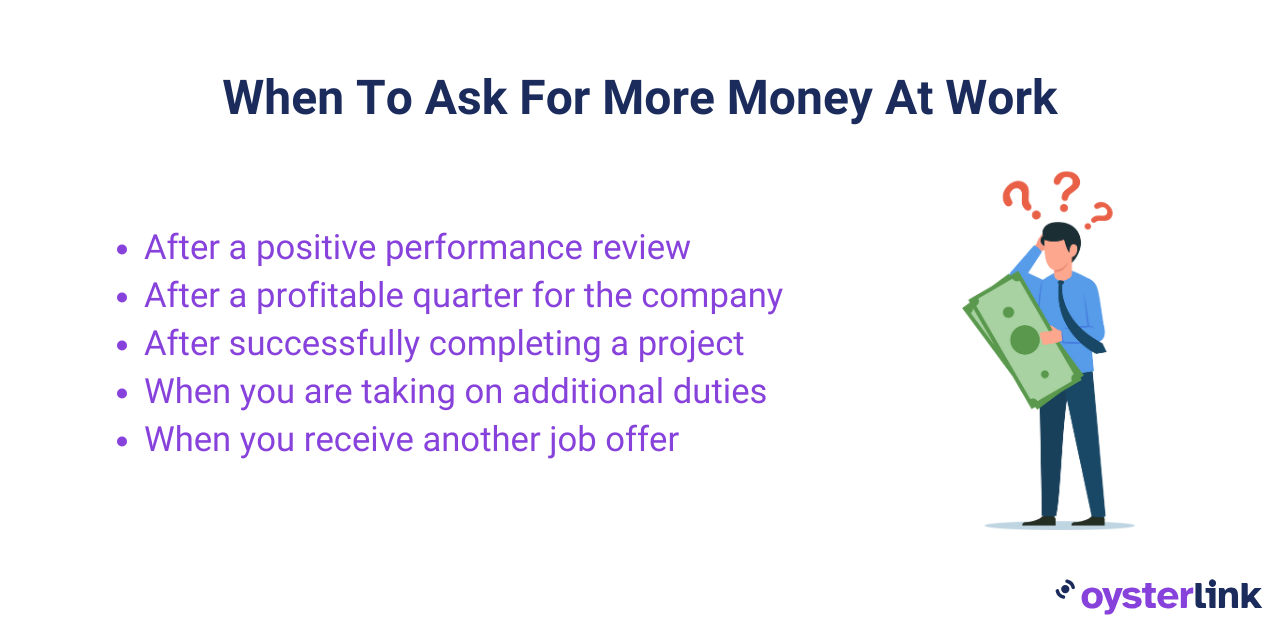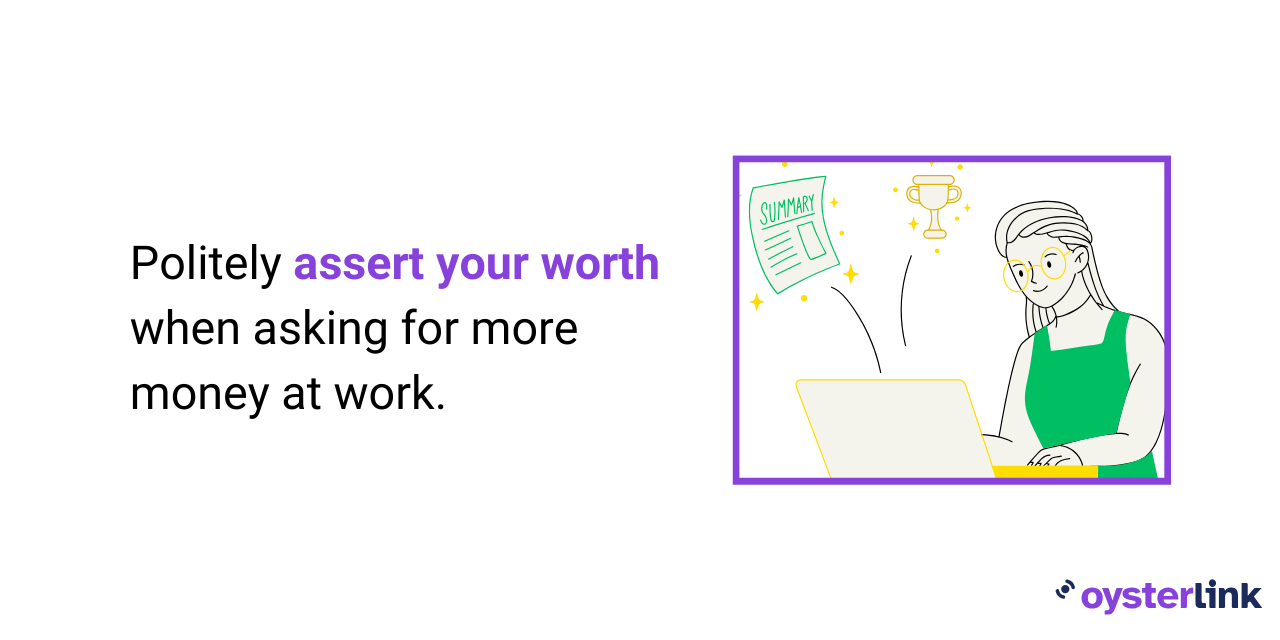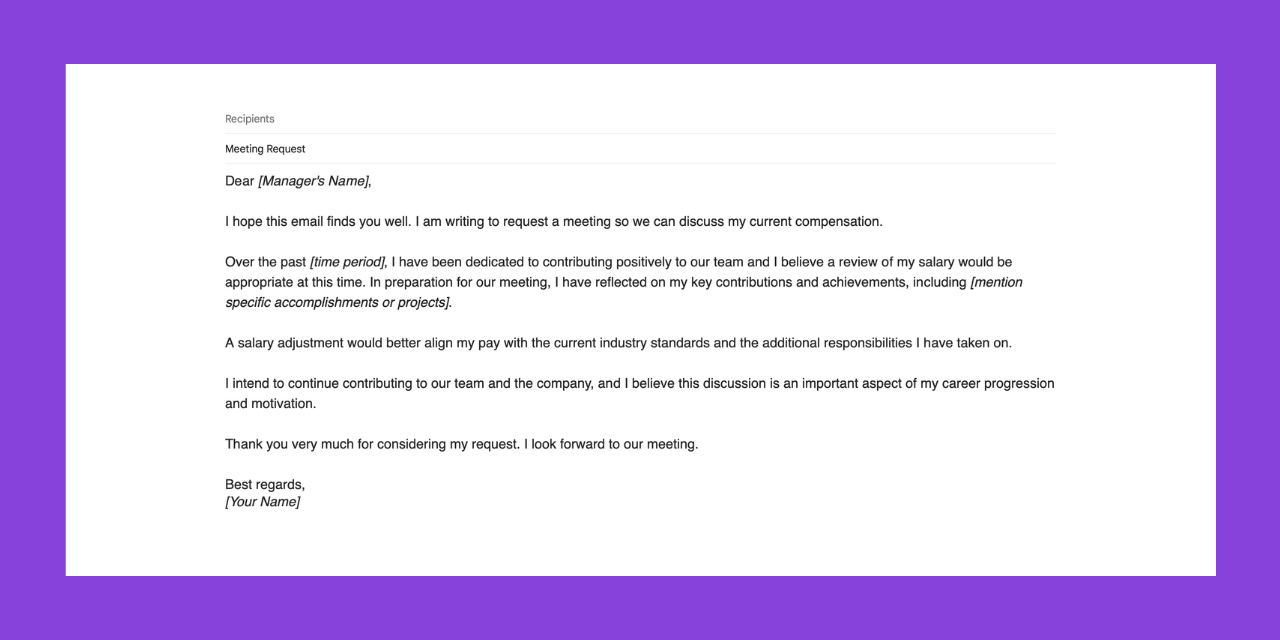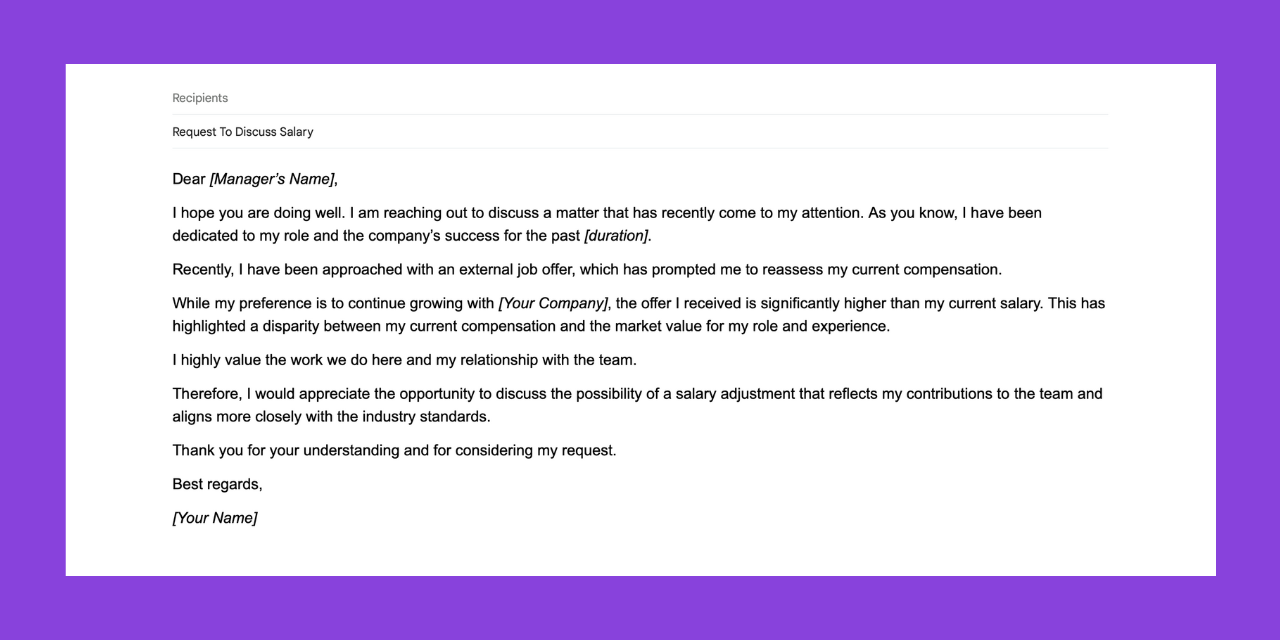Feeling underpaid at work is a common concern among professionals. In fact, a recent survey revealed that 32% of U.S. employees believe their compensation doesn’t align with their efforts and responsibilities.
If you’re not due for a promotion or your company doesn’t offer bonuses, proactively requesting a raise may be the most effective way to secure the pay you deserve.
The question is — how do you ask for more money at work?
In this article, we’ll share tips on how to ask for more money, along with email templates to help you professionally approach this conversation with your employer.
How To Ask for More Money
Even if you believe you deserve a promotion or a higher salary, asking for more money at work isn’t always easy.
Here are tips to help increase your confidence when discussing financial matters with your employer:
1. Track Your Performance
On top of doing great at your job, it’s essential to remind your boss about your contributions.
Keep a detailed record of your achievements, contributions and any additional responsibilities you’ve taken on since your last salary negotiation or since you started the job.
If possible, list the results of your achievements, such as increased sales figures or improved productivity.
In addition, highlight any skills or qualifications you’ve recently acquired that add value to your position.
2. Research Compensation and Salary Trends
Determine the standard market compensation for your role in your industry and location. Consider factors such as your experience level, skills and how they align with industry standards.
To get a better idea of your finances after taxes, use our Paycheck Calculator.
Our calculators are customized for each U.S. state to reflect specific tax laws and deductions. You can also obtain clear breakdowns of your gross pay, deductions and your take-home pay.
3. Pick the Right Moment
Timing is key. Carefully schedule your request to improve your chances of getting more money.
Here are the ideal times to ask for more money at work:
- Following a positive performance review
- After successfully completing a project
- Upon taking on additional duties
- Following a profitable quarter for the company
- When you receive another job offer

4. Schedule a Meeting
Request a private meeting with your supervisor by sending an email. In the email, mention that you would like to discuss your career development.
5. Be Confident Yet Professional
Approach the conversation with a calm and professional demeanor.
Clearly state your request with confidence but avoid coming across as arrogant. Use language that conveys your belief in your worth to the company.
6. Use Smart Negotiation Techniques
If your manager offers a lower salary than you expect, politely assert your worth.
You could say, “I value my experience and contribution to the team. While I appreciate the offer of $55,000, I was hoping for something around $63,500, reflecting my performance and efforts. Could we discuss a salary of $63,500?”

7. Prepare for Different Outcomes
If your employer accepts your negotiation on getting more money, thank them and clarify the next steps. If they decline, ask for feedback about what you can do to be considered for a raise in the future.
However, if they offer a counterproposal, be prepared to negotiate. If the offer is below your expectations but you’re likely to accept, try to negotiate for other benefits.
Email Example on Asking for More Money
Here are sample messages that you can use to ask for more money at work:
Email Example 1: Using a Direct Approach
Dear [Manager’s Name],
I hope this email finds you well. I am writing to request a meeting so we can discuss my current compensation.
Over the past [time period], I have been dedicated to contributing positively to our team and I believe a review of my salary would be appropriate at this time.
In preparation for our meeting, I have reflected on my key contributions and achievements, including [mention specific accomplishments or projects].
A salary adjustment would better align my pay with the current industry standards and the additional responsibilities I have taken on.
I intend to continue contributing to our team and the company, and I believe this discussion is an important aspect of my career progression and motivation.
Thank you very much for considering my request. I look forward to our meeting.
Best regards,
[Your Name]
Here is how your email should look like:

Email Example 2: Using an External Offer as Leverage
Dear [Manager’s Name],
I hope you are doing well. I am reaching out to discuss a matter that has recently come to my attention. As you know, I have been dedicated to my role and the company’s success for the past [duration].
Recently, I have been approached with an external job offer, which has prompted me to reassess my current compensation.
While my preference is to continue growing with [Your Company], the offer I received is significantly higher than my current salary. This has highlighted a disparity between my current compensation and the market value for my role and experience.
I highly value the work we do here and my relationship with the team.
Therefore, I would appreciate the opportunity to discuss the possibility of a salary adjustment that reflects my contributions to the team and aligns more closely with the industry standards.
Thank you for your understanding and for considering my request.
Best regards,
[Your Name]
Here is how your email should look like:

Key Takeaways:
- Self-Assessment: Regularly evaluate and document your professional achievements and additional responsibilities.
- Market Research: Stay informed about industry compensation standards to set realistic salary expectations.
- Strategic Timing: Initiate salary discussions during favorable periods, such as after a successful project or a positive performance review.
- Professional Communication: Maintain a confident yet respectful tone when discussing compensation.
- Negotiation Preparedness: Be ready to discuss and negotiate various aspects of your compensation package.
Gain Career Insights With OysterLink
Negotiating for a higher salary with your current employer can be intimidating. Unlike accepting a counteroffer, asking for better compensation in your current work can risk disrupting your work environment.
There’s often a fear that your manager might react negatively or that a rejection could create an awkward situation.
In OysterLink’s Spotlight section, you’ll find comprehensive resources about the hospitality industry, covering:
- Relevant articles, such as how to respond to a job offer when waiting on other offers, how to evaluate a job offer and reasons you’re getting interviews but no offers
- Updated salary trends for competitive pay
- Detailed job descriptions to match your duties and responsibilities
- Strategies for successful interviews
- Latest industry trends
Our platform can help you connect with top employers in the industry and provide you with essential knowledge to help you move forward in your career.
Sign up with OysterLink today to access these resources and make informed decisions about your job offers.
Be in the loop of the latest hospitality trends.
FAQs
Optimal times include after a positive performance review, upon completing a significant project, when taking on additional responsibilities, following a profitable quarter for the company or when you’ve received another job offer.
Document your achievements, research market compensation trends for your role and location, and practice articulating your value to the company.
Seek feedback on areas for improvement and inquire about the steps needed to be considered for a future raise. This demonstrates your commitment to growth and aligns your goals with the company’s expectations.
By implementing these strategies, you can confidently navigate the process of requesting a salary increase, ensuring your compensation aligns with your contributions and the value you bring to your organization.




